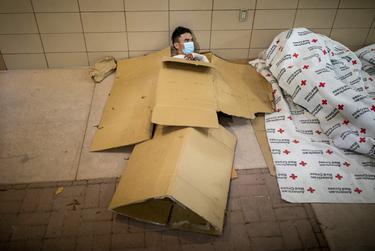In El Paso, migrants are sleeping on the streets after thousands crossed the border last weekend

By Uriel J. García, The Texas Tribune
“In El Paso, migrants are sleeping on the streets after thousands crossed the border last weekend” was first published by The Texas Tribune, a nonprofit, nonpartisan media organization that informs Texans — and engages with them — about public policy, politics, government and statewide issues.
Sign up for The Brief, our daily newsletter that keeps readers up to speed on the most essential Texas news.
EL PASO — Victor Wilson stood in the cold near a downtown bus station with a few dozen fellow migrants on Monday evening and wrapped himself in a thin white blanket that barely protected him from the chilly winds.
Wilson, a 46-year-old Creole man from Nicaragua’s Corn Islands, was among the thousands of migrants who crossed the Rio Grande into El Paso over the weekend. Now he was looking to escape the 45-degree weather and ducked into a nearby parking garage, carrying a bag of potato chips and a 2-liter bottle of pineapple soda.
He laid his blanket over a piece of cardboard, preparing to spend the night in the streets as about two dozen other migrants did the same, some of them fashioning cardboard into a crude tent and wrapping themselves in Red Cross blankets.
That’s when Rosa Falcon, an El Paso resident and teacher’s aide at a local elementary school, appeared at the garage and invited Wilson and four other migrants to her home to spend the night. Wilson said he was grateful he was not going to have to sleep in a parking garage another night — and glad to be on American soil.
“I feel great, I feel happy because I know God is going to help me,” he said.
On Sunday, more than 1,000 migrants, many from Nicaragua, Honduras, Guatemala and the Dominican Republic, crossed the Rio Grande between 4 p.m. and 8 p.m. in one of the largest mass crossings in recent memory. Claudio A. Herrera-Baeza, a U.S. Border Patrol spokesperson, said the El Paso sector — a 268-mile stretch from El Paso to New Mexico’s border with Arizona — has documented more than 2,150 migrant encounters each day in December.
It’s a continuation of a record-breaking year at the southwest border: During the fiscal year that ended on Sept. 30, immigration agents recorded 2.4 million encounters with migrants — the highest number on record. Along the Texas-Mexico border alone, agents recorded nearly 1.4 million encounters with migrants. In fiscal year 2021, 27% of the migrants were apprehended more than once. The federal government hasn’t released recidivism numbers for fiscal year 2022.
On Monday morning, what appeared to be at least a mile-long line of migrants snaked between the river and the steel border barrier as they waited to be taken into custody and processed by Border Patrol agents. Small bonfires burned on the concrete that lines the riverbank.
Between Friday and Sunday, Border Patrol agents released an average of 398 migrants a day from their custody to local shelters, El Paso County facilities or to the streets. Over the previous month, the average was 151 per day.
Among them was Wilson, who said he left Nicaragua because he could no longer support his wife and two sons, ages 7 and 10, with what he earned from fishing. He hopes to get to Florida, where a cousin can host him and where he could earn $300 a day rather than $300 every two months, he said.
/https://static.texastribune.org/media/files/b7d449c9f2b73b290ee8caa61232cfab/Migrants%20El%20Paso%20Dec%2012%20IPA%20TT%2004.jpg)
El Paso asks for federal assistance to help migrants
The rush of migrant crossings into El Paso comes just over a week before the Biden administration is scheduled to end the use of the public emergency health order known as Title 42 — which immigration officials have used 2.4 million times since March 2020 to immediately expel people to Mexico or their home countries without allowing them to request asylum.
Last week, the Biden administration appealed a judge’s ruling that required the government to halt Title 42 by Dec. 21; an appeals court is expected to rule by Friday evening.
Meanwhile, both the city and the county have opened centers this year to help migrants reach their final destinations. El Paso County said its center, which opened Oct. 10, has already received 18,779 migrants and is helping an average of 500 per day. With Title 42 ending, the county is already looking for a larger facility.
From late August through October, the city also chartered 294 buses to take nearly 14,000 migrants to New York City and Chicago.
El Paso Deputy City Manager Mario D’Agostino said during a Tuesday news conference that El Paso is a welcoming city for migrants but doesn’t have enough volunteers and support to help every migrant who needs assistance.
“There is a big heart here, there’s a big desire in our community” to help migrants, he said. “There’s also just not enough to handle this type of load, so we have to be cognizant of that.
“Our infrastructure cannot keep up, there are not enough flights, there’s not enough bus transport out of town on a daily basis to allow same-day travel,” D’Agostino added.
So migrants with nowhere else to go have been sleeping wherever they can in downtown El Paso.
The city says it has spent $9.2 million this year on providing services to migrants and received $2.2 million in reimbursements from the federal government. The city is waiting on another $4.6 million reimbursement.
U.S. Rep. Veronica Escobar, D-El Paso, said in a statement that she asked Department of Homeland Security Secretary Alejandro Mayorkas during his Tuesday visit to El Paso for more federal support for the city and that he told her it’s a priority for the federal government.
“It is critically important that as a nation, we rise to the tremendous challenge that we are facing on immigration today and that we do it in a way that both preserves our security and upholds our values,” Escobar said. “We need not sacrifice our humanitarian values in order to address the overwhelming challenge we must confront.”
“A hard decision to make”
Wilson, who was born and raised on Great Corn Island, said he began catching fish when he was 12. For the past 16 years, he said he worked for a company that would send him and a crew out to sea for two months at a time to catch lobster. As the boat’s second captain, he earned $20 for each 100-pound box of lobster his crew caught. When lobster was abundant, they could fill up to 50 boxes during a two-month trip, he said.
But as the years went by, there were fewer lobsters and more expenses at home, he said, and his income dwindled until it was barely enough to feed his family.
To help pay their bills, Wilson’s wife began to sell homemade fried fish and white rice to tourists and other locals.
So he decided to apply for a visa to come to the U.S. legally and paid $650 to complete the application process — but he was denied in September. For weeks, he debated whether he should leave for the U.S. anyway.
By November, he had made his decision: He was leaving for Miami, where his cousin lived with her husband. He took his wife into their bedroom and told her he was leaving.
“I know she took it hard,” he said.
He packed a small black bag with his identification, passport and some clothes, along with $1,500 for the trip. Then he walked his two sons to school, kissed each one on the cheek and told them he was going to work out in the sea for a few months but that he would be back. He and his wife had decided not to tell them the truth.
“Catch a lot of fish,” his youngest son told him.
As they walked into the school building, Wilson began to cry.
“It’s a hard decision to make, to leave your family behind,” he said.
Wilson said he took the 43-mile boat ride from the island to the mainland, where he met two longtime friends who had also decided to leave Nicaragua. They took a charter bus to Guatemala, then another bus into southern Mexico.
Along the way, he said they found churches whose members would welcome them into their homes to spend the night as they made their way north.
When he and his group of friends arrived at a Juárez bus station on Saturday evening, they took a taxi to the Mexican side of the Rio Grande, where they saw hundreds of other migrants walking through the knee-deep river. When he waded into the water, Wilson said he was so excited that he called his wife.
“I made it,” he told her.
Before she could respond, he said his cellphone slipped from his hand and was washed away. On the U.S. side of the river, he said Border Patrol agents asked all the Nicaraguans to form a line and told all the Venezuelans that they were going to be immediately sent back to Mexico, Wilson said.
He said Border Patrol agents took him into custody, processed him, then released him at the downtown bus station at noon on Sunday with a small group of migrants. Immigration officials gave him a document with the address of an Immigration and Customs Enforcement office in Miami where he would need to report.
/https://static.texastribune.org/media/files/b48867fe74c4a903672c2cdf9d1cb9fe/Migrants%20El%20Paso%20Dec%2012%20IPA%20TT%2009.jpg)
First: David Aburto of Nicaragua uses cardboard boxes to stay warm as he prepares to spend the night in a parking garage on Monday. Last: Two migrant women huddle together to stay warm after being dropped off at a local bus station. Credit: Ivan Pierre Aguirre for The Texas Tribune
He said he wants to request asylum, find a job fishing in Florida and save up enough money to return to Nicaragua and buy a couple of taxis so he can have his own business.
As Falcon, the local resident who welcomed Wilson into her home, was talking to other migrants, Wilson fist-bumped his friends, who were staying behind at the parking garage and told them goodbye.
He said his faith in God is what has led him to kind people who are willing to help.
“If I have water to drink, I thank God,” he said. “So I’m just thankful right now that I’m standing here.”
This article originally appeared in The Texas Tribune at https://www.texastribune.org/2022/12/14/el-paso-migrants-border/.
The Texas Tribune is a member-supported, nonpartisan newsroom informing and engaging Texans on state politics and policy. Learn more at texastribune.org.
You Might Also Like



